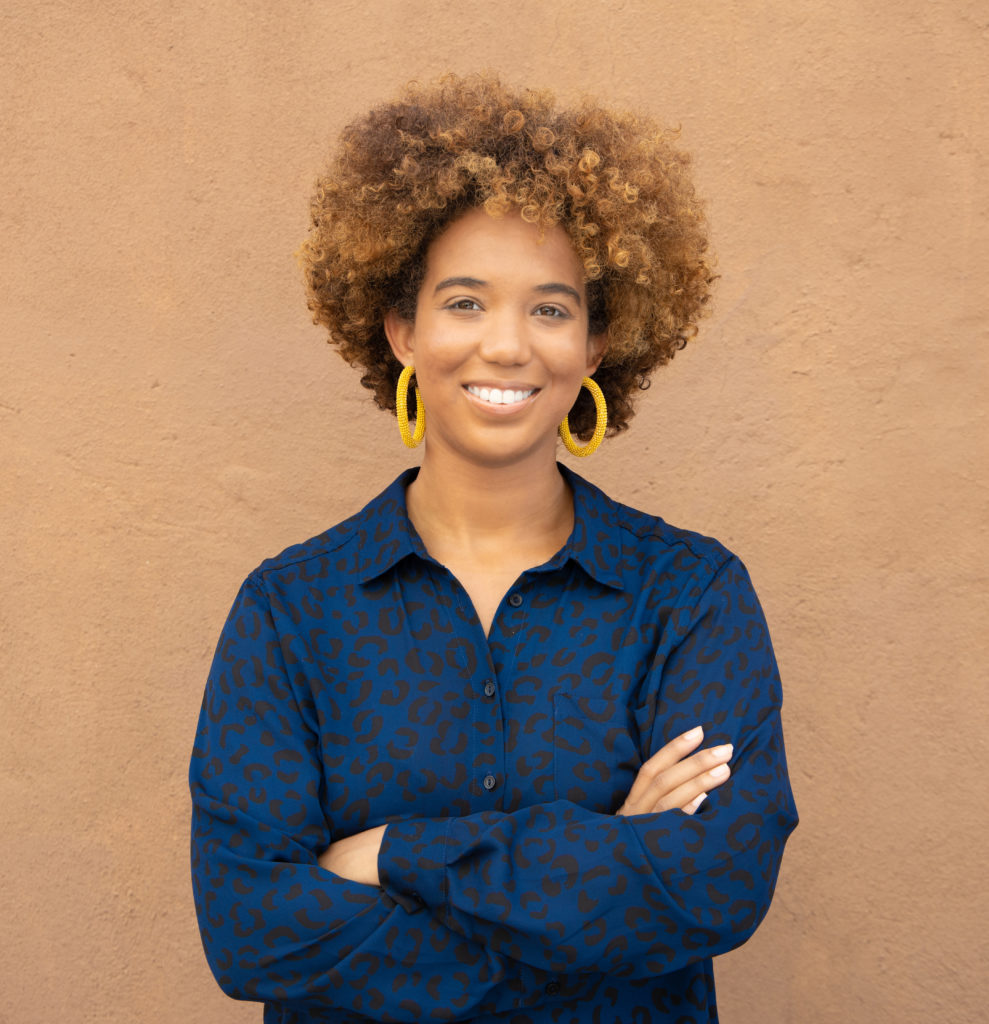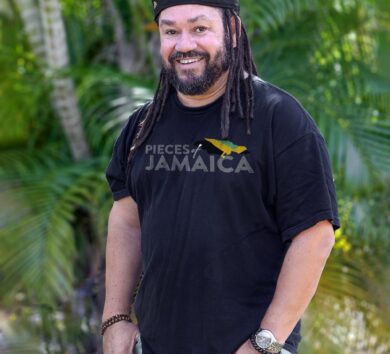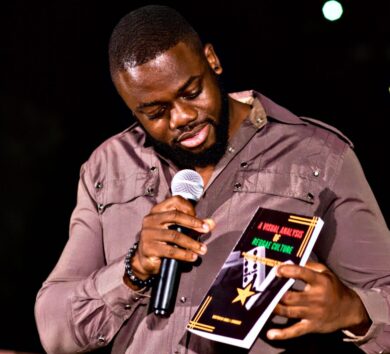
A young Jamaican film-maker’s vision and journey

Writer and documentary filmmaker Joelle Powe is a young lady with a very bright future ahead of her. Already, her talents and abilities have been recognised and acknowledged with her recent inclusion into the Institute of Caribbean Studies “30 under 30” changemaker honourees list for 2021.
Her documentary, Out There Without Fear, about Jamaica’s dancehall culture and its impact and influence, has won plaudits and she has been singled out as one to watch.
Joelle Powe is a student of her craft and what comes across is an active interest in the arts. She is an unapologetic advocate of a better Jamaica, where the arts flourish and opportunities for all prevail.
Our Today sat down with Joelle at Cannonball Cafe, Barbican for this interview over curried goat pot pie, a slice of Pecan pie and lemonade.
Our Today : What led to you pursuing a career as a film-maker and writer?
Joelle: “I believe that filmmaking not only has the power to educate but to transform how we understand any idea. For example, with my first film, Out There Without Fear-Jamaica’s Dance Hall, I saw that Jamaican dancehall dancers have global impact, but they do not get local support and they don’t get the recognition they deserve. Dancehall could be better monetised.”

“I had an essay to write about dancehall, looking at the dancers as artists and creators compared with other dancers and world art forms. I had to look at dancehall as an expression of who we are. I came to the conclusion that film can go further than this. It can reach all Jamaicans and a global audience.”
“I see film as a tool to express my ideas about issues that I am concerned about. I have another film project coming up. This one is on Beverley Manley, which is aimed at getting Jamaicans to rethink, what do we know about Jamaica back in the 80s.? Who were the thinkers of that time? What were the decisions made that has shaped who we are today?”
“That’s why I chose film. It can capture people in a multi-module way through stories. It can educate and transform.”
Our Today: So what are your favourite films?
Joelle: “Number one is Crazy by Peruvian-born Dutch director, Heddy Honigmann. This is a documentary film that came out in 2000 about the traumatic effects of war on the soldiers of United Nations peacekeeping missions and how some used music as a coping method.”

“The second is called Night Mail directed by Basil Wright and Harry Watt. This was released in 1936, narrated by John Grierson with a screenplay by W. H. Auden.”
“This 24-minute film documents the nightly postal train operated by the London, Midland and Scottish Railway (LMS) from London to Glasgow and the staff who operate it.”
“Grierson believed that film could be used as propaganda, a tool of the state to be employed to encourage nationalism very much in the vein of Germany’s Leni Riefenstahl’s (Triumph Of The Will) work to promote German nationalism during World War II.”
“I do think documentaries can engage the nation and help to create a sense of unity and self-ownership of our culture. That’s very much my approach to the process and art of documentary filmmaking.”
“On the fictional side, I do love the Star Wars film series more particularly the latest ones. I like the world created by the Star Wars universe. It is a dramatisation of what is happening today. I am taken by the student /teacher dynamic, good versus evil, all put together splendidly.”
“I must tell you, I am more passionate about documentary film-making.”

Our Today: As a young documentary maker, what can be done to assist those of you dedicated to this art form?
Joelle: “I have found there are plenty of international grants to help get projects completed. There are organisations out there that want to support the growing film industry. For example, I found a grant in Germany from an organization that wants to help filmmakers from developing countries.”
“I think showcasing grant opportunities would be helpful to young filmmakers. Doing these film projects takes money and securing good sponsors makes life easier. I have benefited from that.”
“Mentorship is very important. Being able to work alongside an experienced filmmaker is most beneficial. With my first film, I worked with Adtelligent who brought considerable marketing abilities to Out There Without Fear. They are experts in commercial filmmaking. I was able to go there and get a foundation in documentary making. Learning through a series of film-making courses has been instrumental on my journey.”
“It’s a noble thing to help young filmmakers with their ideas through financial and technical assistance.”
Our Today: Tell me about working with your brother Craig Powe who founded Adtelligent?

Joelle: “My brother Craig is one of my mentors. And I see a lot of collaborations with him in my future. Working with him has been an empowering experience because I didn’t study film at college but rather went through the training and AdIntelligent with its talented videography unit, assisted with the execution of my vision.”
“There haven’t been any difficulties or sibling tensions. He is my older brother and he wants to see me shine. He is very supportive of me. He wants to see my ideas manifest.”
Our Today: What support do you get from your parents?
Joelle: “My parents have given me a thorough education. I went to Hillel Academy which gave me such a good foundation in Math and English. Then I attended Immaculate. I have always been a strong student. My parents have equipped me to succeed and I have been given many opportunities. They have seen to it that I have been exposed to different life experiences.”
“From the age of 12, my mother who works at a senior level in Jamaica’s prison system has been taking me with her to girls programmes there. That was impactful and left an impression on me. It opened my eyes to the plight of many young Jamaican females.”
“My father Sheldon, has built a career in the technology sector. I have grown up with a familiarity with technology and I don’t find it daunting. I have designed and made websites for my documentary film and for the D.K. Duncan memorial website. I am very comfortable with Zoom and use it to stream my work on Jamaican dancehall. My father saw to it that at a very young age I was familiar with Excel spreadsheets and different devices and how to employ them in working for you.”
“My parents were very big on travel. We visited many countries. When I was fifteen, they sent me to Costa Rica to learn Spanish and I stayed with a family there.”
Our Today: Why did you make a film about Jamaican dancehall?

Joelle: “I began to think about it while studying World Art and Cultures at the United World College, Maastricht, the Netherlands. There we were taught to look at art objects as manifestations of identity. it tells a story of the people who have created these works of art, the time they lived in, the context and the trials they endured. For example, the woodblock prints of the Edo period (1615-1868) tells stories of peace, economic growth and social order in Japan.
As part of an assigned project, we had to go find a cultural art form within a period. I chose Jamaican dancehall, after all, I once was a dancer.”
“I began thinking, what do these dancehall dances mean? They all have names such as “Butterfly”, “Signal the plane” what is that all about? What does it say about the people who made them? That was the first essay I wrote about dancehall culture.”
“I set about interviewing dancehall dancers and I was inspired by how far this art form has gone, attracting plenty of international attention. Dancehall is so locally centred in its creative process. The dancers look around at what is happening around them and create dances from that. I find that fascinating and had to document it. I felt I had to take ownership of it as a Jamaican because dancehall has been showing up in many music videos by non-Jamaican artists without proper citation. There is no reference that this is a Jamaican art form.”

“What if there could be a documentary from a Jamaican crew with the dancers explaining how they create this art form? That truly would be a contribution to and celebration of our culture. It would go a long way to creating ownership for the dancehall dancers.”
Stay tuned for part II of the Joelle Powe interview next week.







Comments